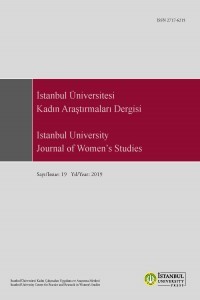AİLE ŞİRKETLERİNİN SÜRDÜRÜLEBİLİRLİĞİ VE FİNANSAL YÖNETİM İLİŞKİSİNDE KADIN YÖNETİCİLERİN ETKİNLİĞİ
Aile işletmeleri ekonomik sistemin
temelini oluşturur. Aile işletmelerinde ise önemli sorunlardan biri
sürekliliğin sağlanamamasıdır. Varlığını sürdürebilen başarılı aile işletmeleri
ulusal ve yerel ekonomileri geliştirecek ve aile işletmesi sahiplerine finansal
güvence sağlayacaktır. Aile işletmelerinin yönetim, finansman ve planlama
problemleri, bu işletmelerin etkinliğini düşürücü bir rol oynamaktadır. Bu
nedenle birçok aile işletmesi üçüncü hatta ikinci kuşağa geçemeden son
bulmaktadır. Bu çalışmanın amacı, kadın yöneticilerin az sayıda olduğu aile
şirketlerinde sürdürülebilirliği, hem ailenin hem de işletmenin başarı ve
etkisi ile açıklamak, finansal yönetimin etkinliği ile ilişkilerini ortaya
koymaktır. Analiz sonucunda kadın yöneticilerin sürdürülebilirlik yetenekleri
ve finansal yönetim arasında güçlü ilişkiler belirlenmiştir.
Anahtar Kelimeler:
Aile İşletmesi, Aile Şirketlerinin Sürdürülebilirliği, Kadın Yöneticiler
EFFECTIVENESS OF FEMALE MANAGERS IN THE RELATIONSHIP BETWEEN FAMILY COMPANIES SUSTAINABILITY AND FINANCIAL MANAGEMENT
Family business forms the basis of
the economic system. In family businesses, one of the important problems is the
lack of continuity. Successful family businesses that can sustain their
existence will develop national and local economies and provide financial
security to family business owners. Management, financing and planning problems
of family businesses play a role in reducing the effectiveness of these
enterprises. For this reason, many family businesses end up on the third line
and not on the second. The aim of this study is to explain sustainability in
the family companies where there is a small number of female managers, both
with the success and influence of the family and the business, to reveal the
relation with the efficiency of financial management. As a result of the
analysis, strong relationships between the sustainability capabilities of
female managers and financial management.
___
- Ada, N. ve Kelkökmen, D. (2006). “Prenses Sendromu: Aile İşletmelerinde Yönetimlerin Kız Çocuklarına Bakışı”, 2. Aile İşletmeleri Kongresi Bildiriler Kitabı, 243-247, İstanbul.
- Akıncı, S. G. (2011). Aile İşletmelerinde Yönetim Kurulunun Yapısal Özelliklerinin Firma Performansına Etkisi, Yayınlanmamış Doktora Tezi, İstanbul Üniversitesi Sosyal Bilimler Enstitüsü, İstanbul.
- Allen, I. E., Langowitz, N. S. (2003). Women in Family-Owned Businesses, Boston: MassMutual Financial Group and Center for Women’s Leadership at Babson College.
- Ateş, Ö. (2005). Aile Şirketleri: Değişim ve Süreklilik, Ankara: Ankara Sanayi Odası Yayını.
- Aronoff, C. E., ve Ward, J. L. (2000), Family Business Values, Family Owners
- Resources, Marietta, Georgia: Business Owner Resources.
- Bozkurt, R. (2004). “Aile İşletmelerinin Sürekliliğinin Sağlanması”, Anahtar, Milli Prodüktivite Merkezi Aylık Yayın Organı, 14-15.
- Chandler, D. (2011). “What Women Bring to The Exercise of Leadership?”, Journal of Strategic Leadership, 3(2), 1-12.
- Çoban, F. (2003). “Kalabalık Aileler-Ailedeki Yeni Sendrom”, Capital, 11(8), 45-55.
- Danes, M. S., Haberman, H. R., McTavish, D. (2005). “Gendered Discourse About Family Business”, Family Relations, 54(1), 116-130.
- Dumas, C. (1989). “Understanding Of Father-Daughter And Father-Son Dyads in Family-Owned Businesses”, Family Business Review, 2(1), 31-46.
- Dumas, C. A. (1992). “Integrating The Daughter Into Family Business Manangement”, Entrepreneurship & Regional Development, 16(4), 41-56.
- Eagly, A. H., Johannesen-Schmidt, M. C. (2001). The Leadership Styles of Woman and Man, Journal of Social Issues, 57(4), 781-797.
- Eagly, A. H. (2013). Sex Differences in Social Behavior: A Social-Role Interpretation, New Jersey: Psychology Press.
- Folker, A. C. (2005). “Female vs. Male Family Business Owners: Exploring The Differences Through A Trust / Distrust Frame Work”, Family Businesses Review, 18(4), 320-341.
- Göker A. Z., Üçok T., (2006) “Aile İşletmeleri ve Karar Verme Süreci, Köklü Aile İşletmelerinde Bir Uygulama”, 2. Aile İşletmeleri Kongresi Bildiriler Kitabı, 45-57, İstanbul.
- Güney, S. (2008). Aile İşletmelerinde Güncel Konu ve Sorunlar, Ankara: Siyasal Kitabevi.
- Haberman, H., Danes, S. M. (2007). “Father-Daughter And Father-Son Family Business Management Transfer Comparison: Family FIRO Model Application”, Family Business Review, 20(1), 163-184.
- Hayton, J., Chandler, G. N., DeTienne, D. R. (2011). “Entrepreneurial Oppor Tunity Identification And New Firm Development Processes : A Comparison of Family And Non-Family New Ventures”, International Journal of Entrepreneurship & Innovation Management, 13(1), 12-31.
- Karpuzoğlu, E. (2001). Büyüyen ve Gelişen Aile Şirketlerinde Kurumsallaşma, İstanbul: Hayat Yayıncılık.
- Kırım, A. (2001). Aile Şirketlerinin Yönetimi, İstanbul: Sistem Yayıncılık.
- Olson, D. P., Zuiker, V. S., Danes, S. M., Stafford, K. (2003). “The Impact of The Family And The Business on Family Business Sustainability”, Journal of Venturing, 18(1), 639- 666.
- Sezgin, F. H., Kınay, B., (2010), “A Dynamic Factor Model for Evaluation of Financial Crises in Turkey”, Bulletin De la Societe des Sciences Medicales, No: 1/10,109-117.
- Sezgin F. H. (2016), “Bayesci Faktör Analizi ve Maslach Tükenmişlik Envanteri Uygulaması”, International Conference on Scientific Cooperation for the Future in the Social Sciences Bildiriler Kitabı, 1283-1296, Uşak.
- Sorenson, L.R. (1999), “Conflict Management Strategies Used by Successful Family Businesses”, Family Business Review, 12(4), 325-339.
- Stafford, K., Duncan, K., Danes, S., Winter, M. (1999). “A Research Model For Sustainable Family Business”, Family Businesses Review, 7(3), 197-208.
- Stravrou, E. T., Kleanthous T., Anastasiou, T. (2005). “Leadership Personality and Firm Culture During Hereditary Transitions in Family Firms: Model Development and Emprical Investigation”, Journal of Small Business Management, 43(2), 187-206.
- Tekinkuş, M. (2006). “Aile Şirketlerindeki Tehlike”, http://www.internethaber.com/aile-sirketlerindeki-tehlike-13092h.htm, (15.02. 2018).
- Ulukan, C. (1999). Aile İşletmelerinde Büyüme Süreci, Yayınlanmamış Doktora Tezi, Anadolu Üniversitesi Sosyal Bilimler Enstitüsü, Eskişehir.
- Uluyol, O. (2004). Aile Şirketleri, Çatışmalar, Finansal Sorunlar Ve Çözümler, Malatya: Medipres Yayıncılık.
- Wolf, A. (2013). The XX Factor: How Working Women Are Creating A New Society, London: Profile Boks Pbc.
- Vera, C.F., Dean, M.A. (2005). “An Examination Of The Challenges Daughters Face in Family Business Succession”, Family Business Review, 18(1), 321-346.
- Yayın Aralığı: Yılda 2 Sayı
- Başlangıç: 2019
- Yayıncı: İstanbul Üniversitesi
